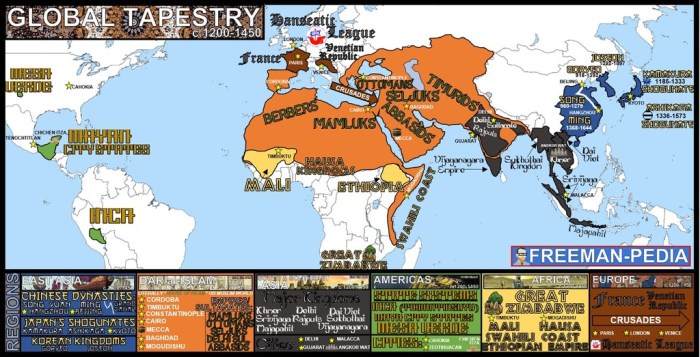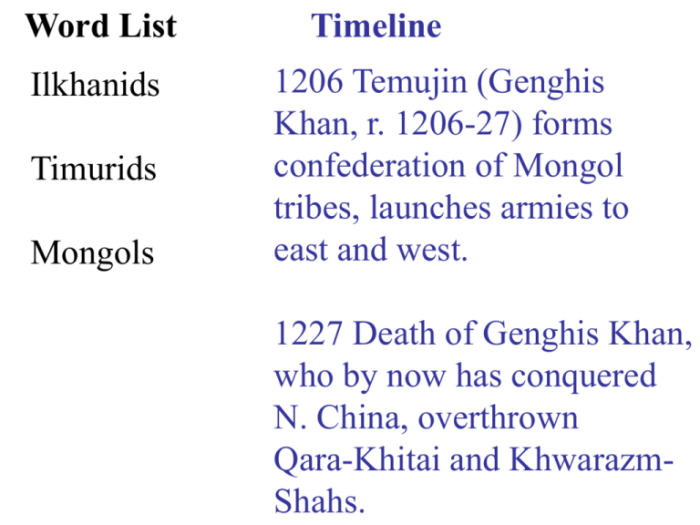Temujin definition ap world history – In the annals of AP World History, the name Temujin reverberates as the moniker of a legendary figure who shaped the course of global events. As the founder and first Great Khan of the Mongol Empire, Temujin’s legacy as a military strategist, unifier, and conqueror continues to captivate historians and scholars alike.
Born into a tumultuous era marked by tribal warfare and political fragmentation, Temujin’s early life was characterized by challenges and adversity. However, his unwavering determination and exceptional leadership skills enabled him to unite the disparate Mongol tribes under his banner, laying the foundation for one of the largest empires in human history.
Definition of Temujin

Temujin, also known as Genghis Khan, was the founder and first Great Khan of the Mongol Empire. He was born in 1162 in the steppes of Mongolia and rose to power after uniting the Mongol tribes under his leadership.
Name Usage
The name “Temujin” is of Mongolian origin and means “blacksmith.” It was given to him by his father, Yesugei, in honor of a blacksmith who had helped the family during a difficult time. Temujin’s name is often used in historical documents to refer to him before he became Genghis Khan.
Significance
The name Temujin has significant historical importance as it represents the early life and identity of Genghis Khan. It reflects his humble origins and the challenges he faced before establishing the Mongol Empire. The name also symbolizes the transformation he underwent from a young warrior to a powerful leader who conquered vast territories.
Historical Context: Temujin Definition Ap World History
Temujin lived during a period of great upheaval and change in Central Asia. The Mongol Empire, founded by his father Yesugei, was a vast and powerful empire that stretched from the Pacific Ocean to the Caspian Sea. However, the empire was also divided into numerous tribes and clans, each with its own leader.
This made it difficult for Temujin to unite the Mongols under his rule.
In addition to the political challenges, Temujin also faced a number of social challenges. The Mongols were a nomadic people, and they often raided and fought with their neighbors. This made it difficult for them to establish a stable and prosperous society.
Temujin was determined to change this, and he set out to unite the Mongols and create a more just and equitable society.
Political Challenges
Temujin faced a number of political challenges as a young leader. The Mongol Empire was divided into numerous tribes and clans, each with its own leader. This made it difficult for Temujin to unite the Mongols under his rule. In addition, the Mongols were often raided by their neighbors, which made it difficult for them to establish a stable and prosperous society.
Social Challenges
Temujin also faced a number of social challenges. The Mongols were a nomadic people, and they often raided and fought with their neighbors. This made it difficult for them to establish a stable and prosperous society. In addition, the Mongols were a patriarchal society, and women had few rights.
Temujin was determined to change this, and he set out to unite the Mongols and create a more just and equitable society.
Unification of the Mongol Empire

Temujin’s unification of the Mongol tribes under his rule was a remarkable achievement that laid the foundation for the Mongol Empire’s expansion and dominance. Through a combination of military prowess, strategic alliances, and astute leadership, he brought together disparate tribes into a cohesive and formidable force.
Military Strategies
Temujin’s military strategies were characterized by their swiftness, flexibility, and ruthlessness. He employed highly mobile cavalry units, utilizing their speed and agility to outmaneuver and overwhelm opponents. The Mongols’ archery skills were unmatched, allowing them to inflict devastating casualties from afar.
Temujin also adopted a policy of total war, often slaughtering entire populations to instill fear and prevent resistance.
Alliances
In addition to his military prowess, Temujin also forged strategic alliances with neighboring tribes. He recognized the value of diplomacy and understood that uniting against common enemies could strengthen his position. Through marriages, treaties, and agreements, he brought together various clans and tribes, expanding his influence and consolidating his power.
Leadership
Temujin’s leadership played a pivotal role in the unification of the Mongol Empire. He possessed a charismatic personality and a keen ability to inspire loyalty. He established a meritocratic system, rewarding followers based on their abilities and accomplishments. Temujin’s vision of a unified Mongol nation under his rule resonated with many, and his determination and ambition drove the tribes towards a common goal.
Impact on Expansion, Temujin definition ap world history
The unification of the Mongol tribes under Temujin’s rule had a profound impact on the expansion of the Mongol Empire. It created a formidable military force that could conquer vast territories and establish control over a vast swath of land.
The unified Mongol Empire became one of the largest and most powerful empires in history, stretching from Eastern Europe to East Asia.
Mongol Conquests

Under Temujin’s leadership, the Mongol armies embarked on a series of conquests that would forever alter the course of world history. Their military campaigns spanned vast distances, from the steppes of Central Asia to the gates of Europe.
The Mongols’ military success can be attributed to several factors, including their highly disciplined and organized army, their skilled horsemanship, and their use of innovative tactics and weapons. They were also adept at adapting to different environments and exploiting their enemies’ weaknesses.
Impact on World History
The Mongol conquests had a profound impact on world history. They facilitated the exchange of ideas and goods between East and West, leading to cultural and technological advancements. They also contributed to the rise of new empires and the decline of others, reshaping the political landscape of Eurasia.
The Mongols’ conquests also had a devastating impact on many populations. They destroyed cities, disrupted trade routes, and caused widespread death and destruction. However, their empire also brought about a period of relative peace and stability, known as the Pax Mongolica, which allowed for the flourishing of trade and cultural exchange.
Legacy of Temujin
Temujin’s legacy as a historical figure is complex and multifaceted. He is remembered both as a ruthless conqueror and a visionary leader who unified the Mongol tribes and established the largest contiguous empire in history.
Different Perspectives on Temujin’s Character and Leadership
There are many different perspectives on Temujin’s character and leadership. Some historians view him as a brilliant military strategist and a charismatic leader who inspired loyalty and obedience from his followers. Others see him as a ruthless tyrant who used violence and intimidation to achieve his goals.
Impact of Temujin’s Rule on the Mongol Empire and Beyond
Temujin’s rule had a profound impact on the Mongol Empire and beyond. He established a centralized government and a system of laws that helped to maintain order and stability within the empire. He also promoted trade and cultural exchange, which led to the spread of Mongol influence throughout Asia and Europe.
Temujin’s legacy continues to be debated today. Some scholars argue that he was a great leader who brought peace and prosperity to the Mongol Empire. Others argue that he was a ruthless conqueror who caused untold suffering and destruction.
Expert Answers
What is the significance of Temujin’s name?
The name Temujin means “blacksmith” in Mongolian and reflects his humble origins as the son of a blacksmith.
How did Temujin unify the Mongol tribes?
Temujin employed a combination of military force, diplomacy, and strategic alliances to unite the Mongol tribes under his rule.
What were the major conquests led by Temujin?
Temujin led the Mongol armies to conquer vast territories, including China, Persia, and parts of Eastern Europe.
What is Temujin’s legacy as a historical figure?
Temujin is remembered as one of the greatest military leaders and empire builders in history, whose conquests and reforms had a profound impact on the world.